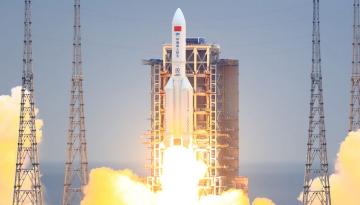The date an out-of-control Chinese space rocket will come crashing back to Earth has been brought forward a couple of days.
The 21-tonne Long March 5B rocket, launched a week ago to deliver the core module of the new Chinese space station into orbit, is currently circling the Earth at just under 300km into the sky - but will come down in a fireball sometime in the next week, experts say.
It's come down about 30km in the past 24 hours, tracking site orbit.ing-now.com says.
Estimates on Tuesday (NZ time) from the US-based nonprofit Aerospace Corporation put its reentry at around 1pm Monday, May 10 (also NZ time), give or take a day or two.
The US now expects it to come down earlier.
"US Space Command is aware of and tracking the location of the Chinese Long March 5B in space, but its exact entry point into the Earth's atmosphere cannot be pinpointed until within hours of its reentry, which is expected around May 8," said Department of Defense Spokesperson Mike Howard (May 9, NZ time).
"Until then, the 18th Space Control Squadron will be offering daily updates to the rocket body's location on www.space-track.org beginning May 4. We will provide additional information as it becomes available."
Russia's Roscosmos space agency put the rocket's re-entry between 1pm May 8 and 8am May 10 (NZ time), while Aerospace Corporation brought forward its estimate to 4pm May 9, plus or minus 28 hours.
China is yet to comment on the rocket.
Most rockets used to put things in orbit detach before getting too high, and safely fall back to Earth in a predetermined area.
This is the second time a Chinese Long March 5B rocket has failed to do this - in April 2020 the same thing happened. That rocket ended up burning up over the Atlantic Ocean, but pieces of it made it to the ground, landing in the water and in villages in Côte d'Ivoire, western Africa. No one was hurt.
It's hard to pick exactly when a piece of junk with a decaying orbit will fall, as it depends on its speed, size, space weather and how thick the upper atmosphere is.
Its orbit takes it around the world once every 90 minutes, including over New Zealand a few times a day.



